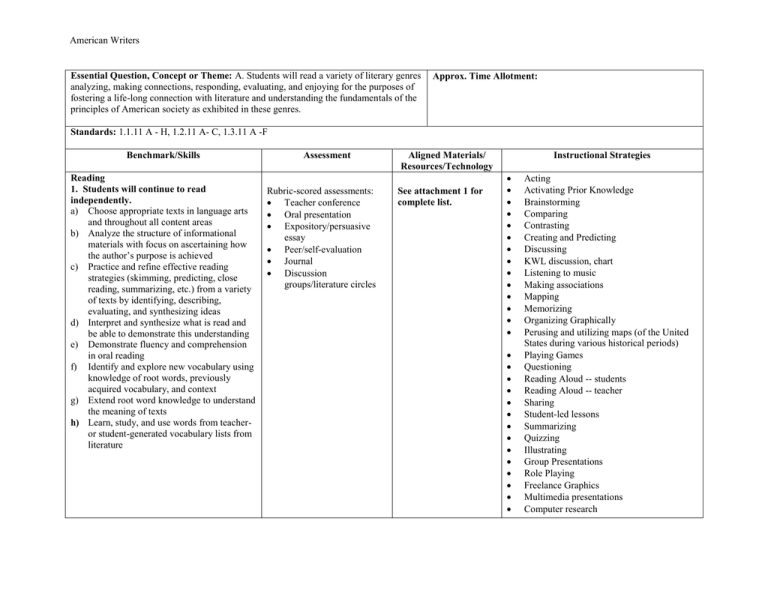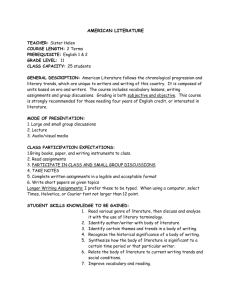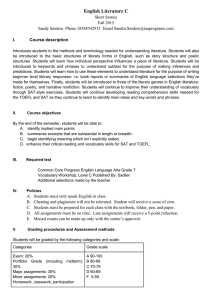American Writers Essential Question, Concept or Theme: Approx. Time Allotment:
advertisement

American Writers Essential Question, Concept or Theme: A. Students will read a variety of literary genres analyzing, making connections, responding, evaluating, and enjoying for the purposes of fostering a life-long connection with literature and understanding the fundamentals of the principles of American society as exhibited in these genres. Approx. Time Allotment: Standards: 1.1.11 A - H, 1.2.11 A- C, 1.3.11 A -F Benchmark/Skills Reading 1. Students will continue to read independently. a) Choose appropriate texts in language arts and throughout all content areas b) Analyze the structure of informational materials with focus on ascertaining how the author’s purpose is achieved c) Practice and refine effective reading strategies (skimming, predicting, close reading, summarizing, etc.) from a variety of texts by identifying, describing, evaluating, and synthesizing ideas d) Interpret and synthesize what is read and be able to demonstrate this understanding e) Demonstrate fluency and comprehension in oral reading f) Identify and explore new vocabulary using knowledge of root words, previously acquired vocabulary, and context g) Extend root word knowledge to understand the meaning of texts h) Learn, study, and use words from teacheror student-generated vocabulary lists from literature Assessment Rubric-scored assessments: Teacher conference Oral presentation Expository/persuasive essay Peer/self-evaluation Journal Discussion groups/literature circles Aligned Materials/ Resources/Technology See attachment 1 for complete list. Instructional Strategies Acting Activating Prior Knowledge Brainstorming Comparing Contrasting Creating and Predicting Discussing KWL discussion, chart Listening to music Making associations Mapping Memorizing Organizing Graphically Perusing and utilizing maps (of the United States during various historical periods) Playing Games Questioning Reading Aloud -- students Reading Aloud -- teacher Sharing Student-led lessons Summarizing Quizzing Illustrating Group Presentations Role Playing Freelance Graphics Multimedia presentations Computer research American Writers Essential Question, Concept or Theme: A. Students will read a variety of literary genres analyzing, making connections, responding, evaluating, and enjoying for the purposes of fostering a life-long connection with literature and understanding the fundamentals of the principles of American society as exhibited in these genres. Approx. Time Allotment: Standards: 1.1.11 A - H, 1.2.11 A- C, 1.3.11 A -F Benchmark/Skills Reading 2. Students will continue to read and evaluate informational texts, documents, and a variety of media as well as evaluate their quality. a) Distinguish between essential and nonessential elements b) Establish and use criteria (factual information, timeliness, tone, author’s prejudice) for decisionmaking c) Differentiate fact from opinion by using complete and accurate information, coherent arguments, and points of view to do so d) Evaluate arguments e) Evaluate task-appropriate materials f) Demonstrate understanding g) Evaluate media material h) Explain effect of modification of discourse based on media and technology i) Explain differences in purposes based on presentation material used. Assessment Rubric-scored assessments: Teacher conference Formal test Oral presentation Expository/persuasive essay Peer/self-evaluation Dialectical journal Discussion groups/literature circles Adventures in American Literature: Harcourt Brace Jovanovich, 1985 Unit Resource Book Reader’s Guidesheets Vocabulary worksheets Selection and Vocabulary check Tests Selection Tests Subunit tests Related skills workshop: worksheets Aligned Materials/ Resources/Technology See attachment 1 for complete list. Instructional Strategies Acting Activating Prior Knowledge Brainstorming Comparing Contrasting Creating and Predicting Discussing KWL discussion, chart Listening to music Making associations Mapping Memorizing Organizing Graphically Perusing and utilizing maps (of the United States during various historical periods) Playing Games Questioning Reading Aloud -- students Reading Aloud -- teacher Sharing Student-led lessons Summarizing Quizzing Illustrating Group Presentations Role Playing Freelance Graphics Multimedia presentations Computer research American Writers Essential Question, Concept or Theme: A. Students will read a variety of literary genres analyzing, making connections, responding, evaluating, and enjoying for the purposes of fostering a life-long connection with literature and understanding the fundamentals of the principles of American society as exhibited in these genres. Standards: 1.1.11 A - H, 1.2.11 A- C, 1.3.11 A -F Benchmark/Skills Reading 3. Students will continue to read, analyze, and interpret literature, as well as be introduced to evaluating the effectiveness of an author’s craft. a) Refine analysis of the relationships, uses, and effectiveness of literary elements, verbally and in writing. b) Refine analysis of the quality of literary devices c) Respond critically, analytically, and with an historical perspective to literature (both fiction and nonfiction) d) Analyze literary structure of texts Assessment Rubric-scored assessments: Teacher conference Formal test Oral presentation/Computergenerated projects Expository/persuasive essay Peer/self-evaluation Discussion groups/literature circles Adventures in American Literature: Harcourt Brace Jovanovich, 1985 Unit Resource Book Reader’s Guidesheets Selection Tests Subunit tests Approx. Time Allotment: Aligned Materials/ Resources/Technology See attachment 1 for complete list. Instructional Strategies Acting Activating Prior Knowledge Brainstorming Comparing Contrasting Creating and Predicting Discussing KWL discussion, chart Listening to music Making associations Mapping Memorizing Organizing Graphically Perusing and utilizing maps (of the United States during various historical periods) Playing Games Questioning Reading Aloud -- students Reading Aloud -- teacher Sharing Student-led lessons Summarizing Quizzing Illustrating Group Presentations Role Playing Freelance Graphics Multimedia presentations Computer research American Writers Essential Question, Concept or Theme: A. Students will read a variety of literary genres analyzing, making connections, responding, evaluating, and enjoying for the purposes of fostering a life-long connection with literature and understanding the fundamentals of the principles of American society as exhibited in these genres. Approx. Time Allotment: Standards: 1.1.11 A - H, 1.2.11 A- C, 1.3.11 A –F Adaptations/Inclusion Techniques Reading As per student’s IEP Audio tape reading assignments Books on tape Extend time parameters Give advance notice regarding future assignments Note taking by classmates for reproduction Offer alternative assignments Offer reading and study guides Peer tutoring and pairing Provide classroom aide Reduce the length of reading assignments Use computer technology Enrichment Strategies Additional reading After school or lunch period learning activities (films, mini-discussion groups) to emphasize unit learning objectives Field trips (museums, plays) Independent study Make given assignments multi-layered and multifaceted Musical adaptations Student-designed activities Computer research Remediation Strategies Peer Tutor Differentiated Instructional Assignments Multicultural/ Interdisciplinary Connection See attachment 2 for complete list. American Writers Essential Question, Concept or Theme: B. Students will continue to engage in the writing process focusing primarily (but not exclusively) on the expository domain, with emphases on using the text as support, clarity in language, integration of concepts from reading into written work, and personal record keeping and resumes. Standards: 1.4.11 A - E, 1.5.11 A - H Benchmark/Skills Writing 1. Students will continue to practice and refine persuasive and informational essays connected to literature read. a) Organize thoughts using varying models b) Plan and or brainstorm prior to writing c) Follow models to facilitate practice d) Practice self-and peer-editing e) Utilize correct form of that writing type f) Use a variety of structures in writing g) Use precise language and details h) Use text citations to support ideas i) Use correctly quotation marks, parentheses, punctuation with citations j) Synthesize ideas from written material in both formal and informal essays k) Maintain a writing folder l) Write timed essays Assessment Rubric-scored assessments: Teacher conference Teacher/self/ peer evaluation Oral presentation comparing drafts with final copy Adventures in American Literature: Harcourt Brace Jovanovich, 1985 Writer’s Workshops: Worksheets, assessments guidelines, and peer and selfevaluations Language workshop: worksheet Related skills workshop: worksheets Approx. Time Allotment: Aligned Materials/ Resources/Technology See attachment 1 for complete list. Instructional Strategies Activating Prior Knowledge Brainstorming Comparing Creating and Predicting Discussing Drilling Editing Extending (add to the piece modeling the writer’s style, tone, purpose) Interviewing KWL discussion, chart Listening to music Making associations Mapping Organizing Graphically Perusing and utilizing maps (of the United States during various historical periods) Playing Games Publishing Questioning Reading Aloud -- students Reading Aloud -- teacher Revising Self-evaluating Sharing Student-led lessons Summarizing Computer research Literary criticism American Writers Essential Question, Concept or Theme: B. Students will continue to engage in the writing Approx. Time Allotment: process focusing primarily (but not exclusively) on the expository domain, with emphases on using the text as support, clarity in language, integration of concepts from reading into written work, and personal record keeping and resumes. Standards: 1.4.11 A - E, 1.5.11 A - H Benchmark/Skills Assessment Aligned Materials/ Resources/Technology Writing Rubric-scored assessments: 2. Students will continue to practice See attachment 1 for complete mechanics and conventions of list. Formal tests writing. Teacher/self/peer evaluation a) Use complete sentences b) Follow grammar rules Adventures in American Literature: c) Use controlled and /or subtle Harcourt Brace Jovanovich, 1985 organizational techniques (logical Writer’s Workshops: order, effective introduction and Worksheets, assessments conclusion) guidelines, and peer- and selfd) Use correct spelling evaluations e) Revise Language workshop: worksheet f) Edit writing using the conventions of Related skills workshop: language worksheets g) Write using well-developed content appropriate for topic h) Write with a command of the stylistic aspects of composition (different types and lengths of sentences, precise language) Instructional Strategies Activating Prior Knowledge Brainstorming Comparing Creating and Predicting Discussing Drilling Editing Extending (add to the piece modeling the writer’s style, tone, purpose) Interviewing KWL discussion, chart Listening to music Making associations Mapping Organizing Graphically Perusing and utilizing maps (of the United States during various historical periods) Playing Games Publishing Questioning Reading Aloud -- students Reading Aloud -- teacher Revising Self-evaluating Sharing Student-led lessons Summarizing Computer research Literary criticism American Writers Essential Question, Concept or Theme: B. Students will continue to engage in the writing process focusing primarily (but not exclusively) on the expository domain, with emphases on using the text as support, clarity in language, integration of concepts from reading into written work, and personal record keeping and resumes. Approx. Time Allotment: Standards: 1.4.11 A - E, 1.5.11 A - H Adaptations/Inclusion Techniques Writing As per student’s IEP Extend time parameters Give advance notice regarding future assignments Note taking by classmates for reproduction Offer alternative assignments Peer tutoring and pairing Provide classroom aide Reduce the length of writing assignments Enrichment Strategies Newspaper articles Letters to the editor Contests Field trips (museums, plays) Independent study Make given assignments multilayered and multifaceted Musical adaptations Student-designed activities Computer research Remediation Strategies Multicultural/ Interdisciplinary Connection Peer Tutor Differentiated Instructional Assignments Raise awareness of the connections between English and other languages (root words, vocabulary, and literary terms) Use art and music as both prewriting stimulation and enhancements to literature ( spirituals, Jazz, American art movement) American Writers Essential Question, Concept or Theme: C. Students will develop appropriate and effective skills in all facets of oral communication. Approx. Time Allotment: Standards: 1.6.11 A - F, 1.7.11 A - C Benchmark/Skills Speaking and Listening 1. Students will practice speaking and listening. a) Participate in large and small group discussion. b) Present information orally, both in formal and informal settings c) Take notes from discussions, lectures, and media presentations d) Practice polite social conventions in regard to speaking and listening e) Ask relevant questions (of teacher and classmates) f) Initiate discussion g) Summarize others’ points h) Demonstrate awareness of negative or positive stereotypes through language Assessment Rubric-scored assessments: Class discussion Debate Notebook Oral presentation: dramatic reading, speech Aligned Materials/ Resources/Technology See attachment 1 for complete list. Instructional Strategies Acting Discussing Interviewing KWL discussion, chart Listening to music Making associations Memorizing Reading Aloud -- teacher Revising Questioning Reading Aloud -- students Student-led lessons Group Presentations Role Playing Multimedia presentations American Writers Essential Question, Concept or Theme: C. Students will develop appropriate and effective skills in all facets of oral communication. Approx. Time Allotment: Standards: 1.6.11 A - F, 1.7.11 A - C Adaptations/Inclusion Techniques Speaking and Listening As per student’s IEP Extend time parameters Give advance notice regarding future assignments Note taking by classmates for reproduction Offer alternative assignments Provide classroom aide Enrichment Strategies After school or lunch period learning activities (films, minidiscussion groups) to emphasize unit learning objectives Field trips (museums, plays) Musical adaptations Remediation Strategies Peer Tutor Differentiated Instructional Assignments Multicultural/ Interdisciplinary Connection Interview with Leslie Marmon Silko Interview with Scott Momaday American Writers Essential Question, Concept or Theme: D. Students will focus on elements of the research process which emphasize working with literary criticism. Approx. Time Allotment: Standards: 1.8.11 all Benchmark/Skills Research 1. Students will continue to learn, practice, and use research skills, particularly with regard to literary criticism. a) Select topics from among those offered or applicable b) Practice development of information seeking strategies c) Practice locating information using a variety of formats d) Practice searching for information using a variety of formats e) Begin to differentiate between authoritative and non-authoritative sources f) Practice notetaking g) Learn and practice reevaluating research questions and findings to determine if steps need to be repeated h) Read, respond to, and evaluate criticism of literary works i) Continue to critically examine findings j) Cite correctly k) Create a bibliography correctly l) Practice responsible and ethical use of all resources according to copyright law m) Practice responsible and ethical behavior in regard to the intellectual property of peer Assessment Rubric-scored assessments: Teacher/self/peer evaluation Aligned Materials/ Resources/Technology See attachment 1 for complete list. Instructional Strategies Brainstorming Comparing Contrasting Editing Interviewing KWL discussion, chart Making associations Mapping Organizing Graphically Perusing and utilizing maps (of the United States during various historical periods) Publishing Revising Questioning Computer research Literary criticism American Writers Essential Question, Concept or Theme: D. Students will focus on elements of the research process which emphasize working with literary criticism. Standards: 1.8.11 all Adaptations/Inclusion Techniques Research As per student’s IEP Audio tape reading assignments Books on tape Extend time parameters Give advance notice regarding future assignments Note taking by classmates for reproduction Offer alternative assignments Offer reading and study guides Peer tutoring and pairing Provide classroom aide Reduce the length of reading assignments Reduce the length of writing assignments Enrichment Strategies Independent study Make given assignments multi-layered and multifaceted Field trips (museums, plays) Independent study Make given assignments multi-layered and multifaceted Computer research Approx. Time Allotment: Remediation Strategies Peer Tutor Differentiated Instructional Assignments Multicultural/ Interdisciplinary Connection See attachment 2 for complete list. American Writers



